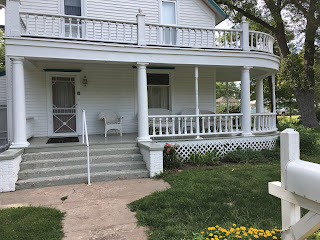When your birthday happens to fall on the date of a total eclipse of the sun, and your younger son has given you eclipse glasses on the previous Christmas, you really have no choice but to make a special pilgrimage to celebrate the coincidence of natality and totality.
So I decided to head to Red Cloud, Nebraska, home of Willa Cather, on the theory that if the weather gods refused to cooperate and the eclipse itself was a total bust, a sojourn in the landscape so beloved of one of America's most brilliant writers would, in itself, make the trip worthwhile.
We drove all day yesterday, almost four hundred miles, most of it on Highway #34, which runs across the bottom edge of Nebraska, parallel to Highway #36, running along the top edge of Kansas, which I used to take back and forth to and from Indiana. I don't like to view America's Heartland from the Interstate, the auotomotive equivalent of a fly-over. I want to pass through its little towns, eat at its hometown cafes, wave close-up at its sunflowers.
We're not only staying in the town made famous as Black Hawk in Willa Cather's pioneer novels, we are staying in her parents' one-time house, the Cather Second Home, now operated as a bed-and-breakfast by the Willa Cather Foundation.
Our room is the one right above the front door in this picture. Although it's the smallest, it's the one Willa herself stayed in when she came to visit once she was all grown up and living in New York City.
Down the street is her childhood home:
Just outside of town is a stretch of virgin prairie, preserved in her name:
Red Cloud isn't in the actual totality zone, so this morning we drove 40 miles north to Hastings. On the ride we listened to a selection of sun-themed classical music pieces courtesy of Nebraska Educational Radio. My favorite: a baroque rendition of George Harrison's "Here Comes the Sun."
The weather gods did indeed bless us so we could view the eclipse from a pleasant park, with a few dozen other spectators.
And it all happened EXACTLY as it was supposed to, with the sun gradually eaten away by the moon, until at precisely 12:58 p.m., it was gone altogether, for two minutes of mid-day darkness.
The thing I hadn't expected was how bright the world remained up until the moment of totality. Even when the sun was ALMOST totally eclipsed, the shadows upon the sunlit grass were sharp; it was still clearly daytime, even with only the merest fingernail paring of sun on view through my eclipse glasses.
Moral: even the tiniest bit of sun is enough to hold off the darkness. A good thing for me to remember from this birthday I'll never forget.
Subscribe to:
Post Comments (Atom)





No comments:
Post a Comment